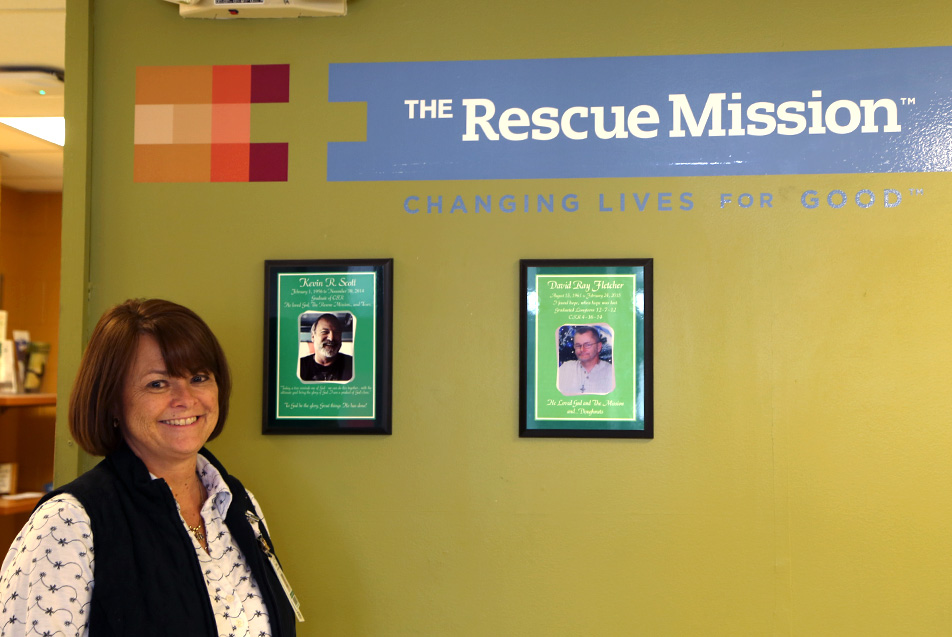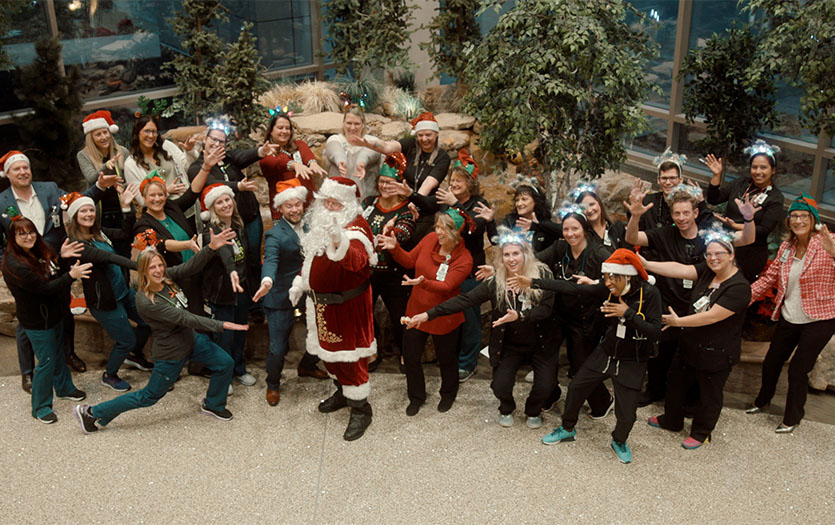
To mark Community Health Improvement Week, we asked Christine Howell, BSN, RN, HN-BC, coordinator, Parkview Community Nursing – who is one of the nurses providing on-site medical care and education at The Rescue Mission – and Sharon Gerig, Director of Emergency Services and Community Outreach for The Rescue Mission, to share more about the important work Christine is doing for the residents downtown.
What is a typical day like for you, Christine?
Christine: No two days are the same. It’s always changing depending on the needs of those entrusted to my care. I typically meet with the breakfast crowd at 7 a.m. to address any health needs that have been identified. We have been called out to the parking lot, the park, up in the dorms, sidewalks and the dining hall.
What services are you providing?
Christine: We navigate the men to services in the community, whether that be insurance, PCP, vision, dental or referrals to specialists. We do education on most health topics. We help with medication management, and educate and encourage clients to fill prescriptions.
What are some of the benefits of having a caregiver on site?
Sharon: I am beginning my 11th year here at The Rescue Mission. Each year has had its challenges and blessings, but I truly believe that one of the biggest blessings has been our partnership with Parkview. Before the nurses were here, myself and other staff (non-medical professionals) did our best to try to make decisions regarding an individual’s physical needs – Do they need to go to the hospital? Should we call the EMS? How do we find out if they have insurance? How can we find out what’s really going on with them physically? Should we call CIT? And many more questions!
With our Parkview “angels” (what I like to call them!) here, we have the resources needed to make even better decisions and the help needed to assist our men as they navigate through issues that can be frustrating. Our process for health insurance is, at times, extremely frustrating. I’ve commented to the nurses often that I understand why those who are homeless are not able to follow through on the paperwork and all that is involved. Many of the men that come to us have physical and mental health challenges that need to be addressed. In the years that the nurses have been here, we have seen hundreds of men address these needs, get on the right medications and have the necessary testing done to address these issues.
Why are these services so important for the homeless population?
Christine: Most of the time, they have had no medical care for years. Having us to help them through the barriers to care is essential. It empowers them to be healthy. They smile when they get teeth. They’re successful when they can read. They don’t have headaches when their blood pressure is improved. They experience less pain when they have had a hip replaced. They have more of an opportunity to be their best self.
What changes have you noticed at The Rescue Mission since this program started?
Sharon: Our trips to the ER and EMS calls have been significantly lower than before we had the nurses here. The ER is the primary care physician for many of the homeless. This results in hospitals having probably thousands or hundreds of thousands of dollars in unpaid bills. We have avoided unnecessary trips to the ER by simply connecting the men with the nurses, or our staff calling the nurses for advice. Many of these men have gotten primary care physicians and no longer need to go to the ER for their ailments. We have men who are now confident enough to call the doctor themselves, to set up appointments or request refills for their meds. They are becoming interdependent, instead of dependent on others, or just totally neglecting this part of their lives.
What does it mean to the residents to have access to healthcare?
Sharon: I firmly believe that we have to address the physical, mental and emotional health of our residents, before we can begin to address their addiction and the circumstances that led to them being homeless and in need of help. I have seen many men who, within a week of addressing their physical challenges, getting on medication, etc., have had clearer minds and a stronger sense of hope. They can begin addressing the difficult circumstances of the past and start to move forward in the process of making real and lasting changes in their lives.
Our nurses are great at listening! They become sounding boards for some of our men – another safe person to talk to and express their fears and challenges to. We have had many men who have had major dental work done, hearing issues addressed, been to the eye doctor, etc., and can actually smile now without being concerned about how their teeth look. They can actually understand conversations better because they can hear! And many who can now read and enjoy it, because they have glasses and can see better.
Do you have a story you can share that illustrates the impact of this work?
Christine: One gentleman comes to mind. He was homeless for many years. He hadn't taken his meds for hypertension in forever. He was feeling bad with horrible oral health. He came to the Mission and went through the program. He got insurance, eventually dentures, got connected to a PCP and placed on blood pressure medication. When he left, he transferred all of his care to his ‘new city’ and is doing well. He periodically comes back to check in with us. During his transition, he would call for support when he didn't understand what to do.
Sharon: It’s hard to pick just one story. I can tell you that I have literally witnessed men’s lives being saved, because of the decisions the nurses have made. We have had men with life-threatening illnesses that were treated in time, because of the nurses giving direction to go to the hospital or to call the EMS. We have men who have been diagnosed with cancer and our nurses have helped us navigate through the very difficult process of treatment, hospice care, etc. We have many men who have left the Mission and returned to let us know how they are doing and to thank the nurses for all they did to help them. Just recently, we had a gentleman who had battled cancer while he was with us, return to ask for our support and prayers as he was told that his cancer had spread. We are a family here, and our Parkview angels play an important role in our family.
What does this partnership mean to you?
Christine: When I hear about other sites that don’t have the support like we do at Parkview, it makes me feel especially grateful. I don't know that the impact would be as great without the support of the health system. It also helps that we have many years of experience with many connections within the system to help us on this journey with those experiencing homelessness.
Sharon: I think this is a beautiful partnership! We have always stated that it is our desire to address the whole being – body, mind and spirit. Before our partnership with Parkview, we struggled, but did our best to address the ‘body’. Now, I can say we are 100 percent better at addressing the physical needs of our residents.
I can’t imagine The Rescue Mission without our partnership with Parkview! We see a lot of men and women come through our doors every day. I know that at times the need can seem overwhelming. But, we are in this together. We often have to remind ourselves why we are here – to change lives for good! We all play a specific role. I love the starfish story … The man walking on the beach who noticed a starfish out of the water and picked it up and put it back in the ocean. He then noticed another, and another, and another. If we help just one, it is worth it! Our nurses help us do that every day.
Defining Community Health Improvement
Parkview’s Community Health Improvement program is an integral part of the health system’s fulfillment of its mission, “to improve the health and inspire the well-being of our communities”, especially for the underserved. The community health improvement program committee oversees the functions of the program, which engages in three primary activities including completion of a triennial community health needs assessment, annual reporting of community benefit to the Indiana State Department of Health and the IRS, and administering a funding program for health programs and initiatives that help to address identified community health needs.



